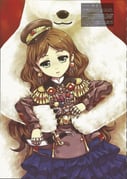Edit
The Communist leader of the Mongolian People's Republic and Marshal (general chief commander) of the Mongolian armed forces from the 1930s until his death in 1952. His rule marked the first and last time in modern Mongolian history that a single individual amassed complete political power. Often referred to as “the Stalin of Mongolia”, Choibalsan oversaw violent Soviet-ordered purges in the late 1930s that resulted in the deaths of an estimated 30,000 to 35,000 Mongolians. Most of the victims were Buddhist clergy, intelligentsia, political dissidents, ethnic Buryats and Kazakhs, and other "enemies of the revolution." His intense persecution of Mongolia's Buddhists brought about their near complete extinction in the country.
Although Choibalsan's devotion to Joseph Stalin helped preserve his country's fledgling independence during the early years of the Mongolian People's Republic (MPR), it also turned Mongolia into the first satellite state of the Soviet Union. Throughout his rule, Mongolia's economic, political, and military ties to the USSR deepened, infrastructure and literacy rates improved, and international recognition of Mongolia's independence expanded, especially after World War II.

